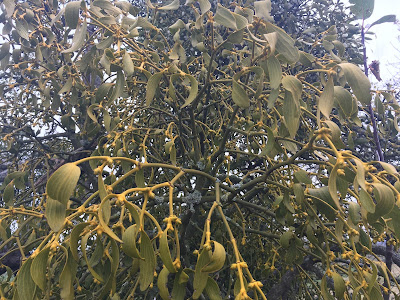Bilbo and I ran across Aller Moor yesterday morning in the pink pearl dawn. The winter sky was ice cream colours as the sun rose. Ice clicked and crunched under my boots. As we reached the end of the drove road, a dozen little egrets took flight from the rhyne where they were fishing. Their pure white feathers glowed rose in the rising sun. These beautiful white herons are a recent addition to our landscape with some 700 breeding pairs here now. They have spread along the south coast and their territory is gradually pushing northwards. We are accustomed to seeing them. Numbers swell to more than 4000 birds during the winter. And they have been joined in Britain, much more recently, by two other white herons: the great egret and the rarer cattle egret. Their presence must be a sign of our changing climate, and that is worrying. But they do add an exotic elegance to our waterways!
Other winter visitors made their presence known too. Redwings called 'tseep tseep' overhead and the fieldfares chuckled. They are feasting on the hawthorn and rosehips. A small group of green sandpipers shot away from Bilbo on the water meadows. Their piping call is typical of the winter countryside. A pair of raven cronked as they passed, and along the Sowy River there were grey wagtail flitting and hunting.
The trees are bare now and they have revealed their hidden treasure: huge globes of mistletoe. In this land of apple trees, it is widespread. It hangs in perfect spheres of bright lime green leaves and ice coloured berries. The trees have their own baubles. We associate it with Christmas and bring it into our homes to hang above our doorways. We enjoy bringing the outside indoors during this darkest season of the year. Linked with ancient fertility rituals, we welcome friends and family with a kiss. But this hemiparasite is not a good neighbour; dense infestation eventually damages the host trees. Many berry eating birds feast on it and pass the seeds to other sites. Our mistle thrush takes its name from the mistletoe - but today, among the other winter thrushes, the mistle thrush was absent.

No comments:
Post a Comment